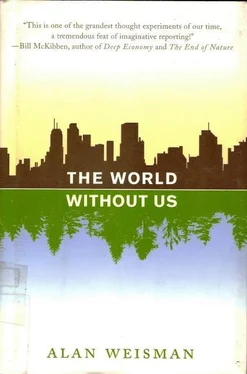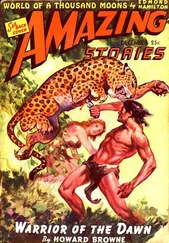Those radio waves don’t die—like light, they travel on. The human brain also emanates electric impulses at very low frequencies: similar to, but far weaker than, the radio waves used to communicate with submarines. Paranormalists, however, insist that our minds are transmitters that, with special effort, can focus like lasers to communicate across great distances, and even make things happen.
That may seem far-fetched, but it’s also a definition of prayer.
The emanations from our brains, like radio waves, must also keep going—where? Space is now described as an expanding bubble, but that architecture is still a theory. Along its great mysterious interstellar curvatures, perhaps it’s not unreasonable to think that our thought waves might eventually find their way back here.
Or even that one day—long after we’re gone, unbearably lonely for the beautiful world from which we so foolishly banished ourselves—we, or our memories, might surf home aboard a cosmic electromagnetic wave to haunt our beloved Earth.
ACKNOWLEDGMENTS

In July of 2003, tired of watching drought, bark beetles, and fires devour chunks of the Arizona forests I had long called home, I escaped to what I hoped would be more benign weather in upstate New York. The night I arrived at a friend’s cabin, so did the first tornado to ever hit the Catskills. The next day, while we were discussing how to remove a seven-foot-long section of spruce sapling that had skewered the eaves like a javelin, I got a message from Josie Glausiusz.
Josie, an editor at Discover Magazine , had recently reread an article I’d written for Harper’s years earlier, describing how when humans fled Chernobyl, nature rushed in to fill our void. Plutonium or not, the ecosystem surrounding the ruined reactor seemed better off without us. “What,” she asked me, “would happen if humans disappeared everywhere?”
It was a deceptively simple question that, I came to understand, lets us view our Earth’s current myriad stresses from the disarming vantage of a fantasy in which we supposedly no longer exist, yet somehow we get to watch what unfolds next. Watch, and maybe learn. The article Josie asked me to write led me to this book-length attempt to address her question more thoroughly, and I am ever grateful to her for posing it.
My agent, Nicholas Ellison, not only sensed a fascinating book in it, but found me the right editor. John Parsley at Thomas Dunne Books/St. Martin’s Press has provided continual reassurance, especially when my research inevitably led to some dark places. I’m indebted to Nick and John, not only for their professional skill and counsel, but also for always helping me recall why I was writing this.
To produce a book that credibly evokes how our world would continue without people is to enter a paradox that ranks with any Buddhist conundrum: it can’t be done without the help of a large supporting cast of humans. Many have appeared in these pages, and I owe them enormously for helping me understand our planet through their eyes, hearts, and expertise. There were many others whose vital contributions are not obvious in the narrative, if only for the sake of economy: had I included everyone’s instructive stories, this volume would have been four times heavier than it is.
Among them, I deeply thank Peter Jessop of Integrity Development and Construction in Amherst, Massachusetts, and his design colleagues Anna Novey, Kyle Wilson, and Ben Goodale. Along with Amherst architects Chris Riddle and Laura Fitch, they explained details I’d never dreamed of about the kind of frame structures in which I’ve lived much of my life. Similarly, a day spent with architect Erin Moore and Arizona State Museum antiquities conservation specialist Chris White, walking through another place I’ve called home, Tucson, was both illuminating and humbling to realize how much of my own surroundings I’d never fully seen before. In New York City, landscape architects Laura Starr and Stephen Whitehouse, who had just guided the redesign of Battery Park, offered many insights and even more questions that I needed to probe in order to address the fate of buildings, infrastructure, and landscaping without constant human maintenance.
I also thank Brooklyn Botanical Garden’s Steve Clemants, who spent some patient hours enlightening me, as did New York Botanical Garden’s Dennis Stevenson, Chuck Peters, and herbarium director Barbara Thiers. Across the parkway at the Bronx Zoo, Eric Sanderson and his Mannahatta Project gave me continual inspiration. Charles Seaton of New York Transit arranged my trek through the subways, which Paul Schuber and Peter Briffa ably and affably guided. I spent yet more hours with Cooper Union’s civil engineering chairman Jameel Ahmad, and with NYU’s poly-talented scientist Tyler Volk and physicist Marty Hoffert. And, courtesy of Jerry Del Tufo, I now appreciate that a bridge is so much more than simply a means to the other side.
Outer space is as far a stretch from home as we can make; it’s my good fortune, however, to have had a genuine rocket scientist for a neighbor. Astrophysicist Jonathan Lunine of the University of Arizona is responsible for much of the thrilling work that has brought us images and understanding of the outer planets. He has the gift of explaining hugely complex cosmic matters in language that not just a college freshman, but even I can understand, and to him I owe the idea of using the I Love Lucy show to demonstrate the trajectory of radio signals.
Previous assignments had taken me to some locations that became settings for this book, but several others I had never seen before. In each, I am beholden to people whose knowledge, patience, and generosity added up to an enthralling education.
In Ecuador, I thank cousins Gloria, Bartolo, and Luciano Ushigua: a new generation of Zápara leaders, resurrecting their people.
Seeing Poland’s and Belarus’s ancient Białowieża Puszcza/Belovezhskaya Pushcha felt like entering holy ground. It is a pilgrimage that I wish every European might make, lest this unparalleled natural heirloom be overwhelmed. My thanks to Andrzej Bobiec, Bogdan Jaroszewicz, and Heorhi Kazulka, not only for showing it to me, but for their exemplary courage and principles.
On the beautiful, sadly divided island of Cyprus, I toured the Green Line courtesy of Wlodek Cibor of the United Nations Peacekeeping Force in Cyprus. Asu Muhtaroglu of the Ministry of Foreign Affairs, Turkish Cyprus, and botanist Mustafa Kemal Merakli showed me Varosha, Karpaz, and much more, as did artist and horticulturist Hikmet Uluçan. In Kyrenia, I thank Kenan Atakol of the CEVKOVA Environmental Protection Trust, Bertil Wedin, Felicity Alcock, and the late Allan Cavinder—and, for invaluable advice and introductions, a longtime former Cyprus resident: American classical guitarist, journalist, and novelist Anthony Weller.
In Turkey, I am deeply obliged for the help and imagination of another novelist, Elif Shafak, who also introduced me to journalists Eyiip Can and David Judson, editors at the Istanbul newspaper Referans . Eyüp, in turn, connected me to columnist Metin Münir. All these people gorged me with more wonderful ideas, food, drink, and friendship than I knew a human could hold: learning that it’s possible is one of the blessings of field research. In Cappadocia, my excellent guide, Ahmet Sezgin, took me to the Nevşehir Museum to meet archaeologist Murat Ertuğrul Gülyaz, another new friend I intend to keep. Yet another fine journalist, Melis Şenerdem, translated my conversation with Sufi master Abdülhamit Çakmut of the Mevlâna Educational and Cultural Society. After having the honor of witnessing his dervish disciples whirl, I am beholden to him for their reminder that humans are capable of not just Earthly, but ethereal beauty.
Читать дальше












